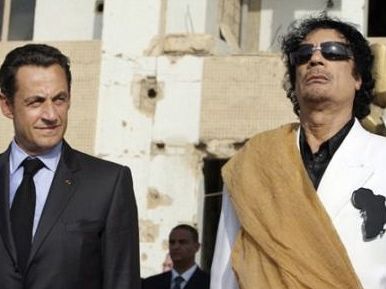According to right-wing Italian journalist Franco Bechis, plans to spark the Benghazi rebellion were initiated by French intelligence services in November 2010. As Miguel Martinez from the progressive ComeDonChisciotte website observes, these revelations which have the blessing of the Italian secret services should be interpreted as the sign of existing rivalries within the European capitalist camp.
Voltaire Network wishes to point out that Paris promptly paired up with London in its scheme to overthrow Colonel Khadafi (Franco-British expeditionary force). This plan was recalibrated in the context of the Arab revolutions and taken over by Washington, which imposed its own objectives (counter-revolution in the Arab world and landing AfriCom on the Black continent). Therefore, the current coalition arises from a diversity of ambitions, which accounts for its internal contradictions. The timeline of events which set the stage for the military intervention against Libya is presented below.

Timeline of events
October 6, 2011
Nouri Mesmari turned himself over to the French secret service and, according to the Italians, he masterminded the revolution against Gaddafi. The document was leaked to Italian newspaper Libero.
In the documents, the French secret services refer to Mesmari as ‘The Libyan Wikileak’ because he gave them all the inside information about the regime as well as an account of who’s who in Libya and who they should or should not contact.
With all the inside information, the Italians claim that by mid-January the French had paved the way for the beginning of the revolution against Gaddafi.
October 20, 2010

Nouri Masmari boarded a Libyan Arab plane headed for Tunis accompanied by all his family. The day after, they were en route to France, claiming that he travelled to Paris due to health reasons. He stayed at the Concorde Lafayette Hotel.
In Paris he never met any doctors. In the following days he had several top secret meetings with high secret service French agents and other top government functionaries close to Nicolas Sarkozy.
November 16, 2010
A long caravan of official cars is parked in front of the hotel Concorde Lafayette whilst in the Mesmari suite an important meeting is taking place. It is a long meeting.
November 18, 2010
A French ‘commercial’ delegation leaves for Benghazi. In the delegation there are officials from the Ministry of Agriculture and representitives from Cam Cereals, France Export Cereals, Cargill, Glencore, France Agrimer, Soufflet, Louis Dreyfous, and Comagra.
Among the delegation, posing as government officials, there are French secret service
agents and military staff. Their ‘business’ was meeting army officers fingered by
Mesmari as being willing to defect from the Libyan army.
While in Benghazi, contact is made with Libyan air defence colonel Abdallah Gehani, who
was designated by Nouri Mesmari as an army officer who is ready to collaborate in toppling
Muammar Gaddafi. Gehani had good contacts in Tunisia too.
It is a secret operation but the Libyan regime suspects that a double game was being
played and that something was about to happen.
November 28, 2010
An international warrant of arrest is issued by the Libyan government for Nouri Mesrami.
Foreign Minister Musa Koussa is held responsible for the defection of Mesrami and his
passport is withdrawn by the authorities.

December 2, 2010
French authorities announce that they have arrested a collaborator of Gaddafi. Word
reaches Gaddafi that Mesrami is under house arrest at the Concorde Lafayette Hotel and is
furious that his former friend and colleague asked for political asylum in France, where
he still resides to this date. In fact during the first week of the uprising in Libya
Mesrami gave interviews to Al Jazeera from a Paris studio.
Muammar Gaddafi sends messages to Nouri Mesrami to win him back saying that he forgives
him for what he did and invites him back to Libya.
December 16, 2010
An Gaddafi emissary, Head of state media Abdallah Mansour, is arrested at the Hotel
Concorde Lafayette trying to contact Mesrami.
December 23, 2010
A delegation of Libyans arrives in Paris for meetings with Mesrami and other French
officials. The Libyans are Ali Ounes Mansouri, Farj Charrant and Fathi Boukhris. These
three men will be known later together with Ali Hajj as leaders of the revolution, that
started from Benghazi.
The Libyan delegation together with Mesrami and French military and secret service
personnel dined at an elegant French restaurant at the Champs Elisée.
December 25 – 31, 2010
Between Christmas and the start of the New Year, the French are in possession of all the details and available inside
information; in the compilation of the Maghreb Confidential document, it is
stated that “the situation in Benghazi is boiling”.
Januray 22, 2011
Colonel Abdallah Gehani is arrested by the chief of the secret service in Cerenaica, Aoudh
Saaiti. Two days later the Colonel is transferred to a prison in Tripoli and accused of
treason with the aim of holding back any dissent. But it was too late, the ball was
already rolling and the first signs of the revolution were seen a few days after
a prominent lawyer, Fathi Tarbel, was arrested. The protest soon turned into clashes and
as army officials deserted, the rebels advanced and took over important cities, but so far
they have failed to take Tripoli.
The French government led the airstrikes over Libya, was the first European state to
recognise the new Libyan National Council and establish diplomatic relations. Since the
Italian government was made aware of the documents, it started to take the back seat in
the Libya crisis, and Prime Minister Berlusconi said that Italian military planes will
not be engaged in airstrikes and that he hopes that it does not end in war.
 Articles by this author
Articles by this author

















Stay In Touch
Follow us on social networks
Subscribe to weekly newsletter